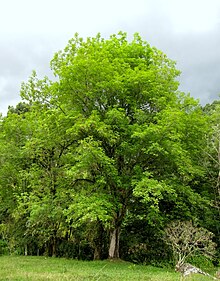| Fraxinus uhdei | |
|---|---|

| |
| Conservation status | |
 Least Concern (IUCN 3.1) | |
| Scientific classification | |
| Kingdom: | Plantae |
| Clade: | Tracheophytes |
| Clade: | Angiosperms |
| Clade: | Eudicots |
| Clade: | Asterids |
| Order: | Lamiales |
| Family: | Oleaceae |
| Genus: | Fraxinus |
| Section: | Fraxinus sect. Melioides |
| Species: | F. uhdei |
| Binomial name | |
| Fraxinus uhdei (Wenz. [es]) Lingelsh | |
| Synonyms | |
| |
Fraxinus uhdei, commonly known as tropical ash or Shamel ash, is a species of tree native to Mexico and Central America. It is commonly planted as a street tree in Mexico and the southwestern United States. It has also been planted and spread from cultivation in Hawaii, where it is now considered an invasive species.
Like other species in the section Melioides, Fraxinus uhdei is dioecious, with male and female flowers produced on separate individuals.
Taxonomy
The tropical ash was originally described as a variety of Fraxinus americana (white ash) by Theodor Wenzig [es] in 1883 and was separated as a different species in 1907 by Alexander von Lingelsheim. The specific epithet uhdei refers to Carl Uhde, a German plant collector who explored Mexico in the 1840s.
Fraxinus uhdei is locally known as fresno blanco in Spanish; other English vernacular names include Hawaiian ash and Mexican ash. The name Shamel ash refers to Archie Shamel, who introduced the trees to California in the 1920s. It is known as urapan in Colombia, where it was introduced in the 1950s.
Ecology
A dieback caused by a phytoplasma was recorded in Colombia and Ecuador in 2004.
References
- Westwood, M.; Samain, M.; Martínez Salas, E. (2017). "Fraxinus uhdei". IUCN Red List of Threatened Species. 2017: e.T96444707A96444709. doi:10.2305/IUCN.UK.2017-3.RLTS.T96444707A96444709.en. Retrieved 11 January 2023.
- "Fraxinus uhdei (Wenz.) Lingelsh". Plants of the World Online. Royal Botanic Gardens, Kew. Retrieved 3 January 2021.
- ^ Pasiecznik, Nick (2016). "Fraxinus uhdei". Invasive Species Compendium. Centre for Agriculture and Bioscience International (CABI). Retrieved 3 January 2021.
- Wallander, Eva (2008). "Systematics of Fraxinus (Oleaceae) and evolution of dioecy". Plant Systematics and Evolution. 273 (1–2): 25–49. doi:10.1007/s00606-008-0005-3. S2CID 24152294.
- "Fraxinus americana var. uhdei Wenz". International Plant Names Index. Royal Botanic Gardens, Kew, Harvard University Herbaria & Libraries, and Australian National Botanic Gardens. Retrieved 3 January 2021.
- "Fraxinus uhdei Lingelsh". International Plant Names Index. Royal Botanic Gardens, Kew, Harvard University Herbaria & Libraries, and Australian National Botanic Gardens. Retrieved 3 January 2021.
- ^ Bracewell R.N. 2005. Trees of Stanford and environs. Stanford, CA, USA: Stanford Historical Society
- ^ Filgueira, J. J.; Franco-Lara, L.; Salcedo, J. E.; Gaitan, S. L.; Boa, E. R. (2004). "Urapan (Fraxinus udhei) dieback, a new disease associated with a phytoplasma in Colombia". Plant Pathology. 53 (4): 520. doi:10.1111/j.1365-3059.2004.01030.x.
| Taxon identifiers | |
|---|---|
| Fraxinus uhdei |
|
| Fraxinus americana var. uhdei | |
This Oleaceae article is a stub. You can help Misplaced Pages by expanding it. |